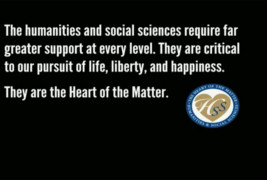The humanities in any of its various disciplines could not possibly prepare someone for a useful occupation. Doctors, lawyers, engineers, and CEOs are not interested in nor have any use for an education in the humanities. This has lately become the dominant opinion of the humanistic enterprise. There are no verifiable benefits and for first time in college students it does not immediately or obviously lead to a career. It’s a luxury that young people (and their parents of course) can hardly afford in a struggling economy where they are already being burdened with a tremendous amount of student debt. This prevailing judgment coupled with increased national focus on and funding of STEM (science, technology, engineering, and mathematics) research and education has resulted in a steady downslide in the number of humanities majors and subsequent hardship for scholars and departments.
In an attempt to rally support for the humanities, and in response to a bipartisan request from members of the U.S. Senate and House of Representatives, the American Academy of Arts and Sciences (the AAAS) presented a report assessing the state of the humanities, recommending alternate sources of funding, and noting the contributions that the humanities make in 3 major areas: public discourse and informed citizenry, national security, and the work force. It’s clear from the report’s pronounced vocational emphasis that the contributing members of the AAAS viewed the last area as the most significant hurdle, and for good reason. There is not much else on the minds of Americans, post-economic crisis, than job growth.
Much like the National Academies’ persuasive and successful report on the value of STEM disciplines, “Rising Above the Gathering Storm” (2007), the AAAS report, “The Heart of the Matter”, attempts to defend the worth of the humanities by arguing that such disciplines help us understand (1) what it means to be human; (2) how to engage with our surroundings in a meaningful way; and (3) how to be valuable members of the global community. It’s a romantic notion – and not inaccurate. But will that kind of knowledge pay the bills? As a college graduate with two degrees in the humanities and a corporate job with benefits, I can decidedly say: yes. However, the job anxiety existing amongst the general public, in addition to our public leaders, is not easily assuaged, and the residual effects of that anxiety continue to have cultural, economic and environmental impact. This has been especially apparent in Florida.
Although fear of unemployment is certainly a national issue, the effects of job anxiety have been inordinately exacerbated in Florida due in no small part to Governor Rick Scott’s aggressive pursuit of a more business-friendly state. Over the past two and half years the governor’s focus on job creation has centered on cutting taxes, state spending, and regulations in order to attract private corporations to do business here. And it has worked. Florida’s unemployment rate is 7.1% – lower than the national average – and continues to drop. However, what is rarely mentioned on letsgettowork.com, a website advocating Governor Scott’s fiscal platform, are the casualties of the state-business model being employed and the lengths to which that model extends.
Particularly relevant to the plight of the humanities is Governor Scott’s task force that was assembled in May 2012 which introduced the idea of “differentiated tuition” – a model that would freeze tuition over the next few years for bachelor’s degree programs identified by the state’s legislature as “high-skill, high-wage, high-demand” (i.e., largely STEM subjects) but allow tuition to rise in other programs. If you have recently attended a university orientation as a first time in college student or the parent of one, the idea of knocking a few thousand dollars off that tens-of-thousands of dollars tuition bill seems inviting. It is difficult to imagine how that kind of incentive wouldn’t adversely affect the number of majors outside STEM subjects. The result – as argued in “The Heart of the Matter” – is less culturally aware citizens. Citizens who are less equipped to participate in their own democracy and who have less creativity, critical thinking skills, and ability to contribute through innovation to their chosen fields. What sort of professionals will Florida public universities produce if their students are sold on a specific field of study solely by a sticker price? And how valuable is the size of Florida’s work force if the quality of the individual worker is diminished by a lack of cultural perspective and ability to problem solve? The report made by Governor Scott’s task force doesn’t consider these questions. And truthfully, it would be difficult to guess what kind of affect a cut-price degree would create in the minds of future students. The fact remains, however, that it has created a disturbing precedent – essentially asserting that the value of a particular field of study will be judged chiefly by its verifiably beneficial contribution to the state economy.
The effects of the overwhelming value put on job creation in Florida have been detrimental beyond matters of education. Recent attractive offers of decreased regulation and tax cuts for new and existing businesses in Florida have come at the expense of our environment, our natural resources, and our ability as informed citizens, government bodies, and regulatory agencies to challenge business practices when they adversely affect our environment. Two months ago Governor Scott championed and signed into law two controversial bills – SB 1808, a water nutrient standard bill, and HB 999 which covered a wide, sweeping range of environmental regulation issues (some of which were minor, some were not). Both bills aimed to remove the power of citizens and regulatory agencies to challenge businesses using state-owned land. That power is now in the hands of the state. SB 1808 specifically designates that Florida implement its own standards for determining allowable levels of pollutants in waterways (from irrigation and storm water runoff) as opposed to standards set by the Environmental Protection Agency (EPA). Many environmentalist groups fear that the state can’t be trusted to formulate and regulate standards regarding pollution levels of phosphorus and nitrogen in Florida waterways that have been linked to outbreaks of algae blooms and toxic slime. This is especially true given the aim of our current political leaders to make it easier for companies to do business here. One of the more controversial provisions grouped into HB 999 blocks a lawsuit – and any further lawsuits – filed by the Florida Wildlife Federation (FWF) over a state-approved no-bid lease agreement that allows Florida Crystals to farm another 30 years in the Everglades Agricultural Area. Here, the intent is again to decrease regulations and avoid any lengthy legal challenges made by the FWF to what could be perceived as harmful leases. Environmentalist groups have speculated that it would result in an increase in the cost of the ongoing Everglades restoration projects and further degradation of water quality. Both bills have been accused of catering to special interests rather than being beneficial to the state and the natural environment, and it’s not difficult to see why.
Our governor has intimated that anthropology and fields like it are neither wanted nor needed in our public universities (despite his daughter having a BA in the subject from William and Mary). By eliminating the humanities – even by just making them less accessible – we’re eliminating a future generation of critics, community leaders, poets, artists, and activists that will challenge these types of issues. A voice, or many voices, for the natural environment of our uniquely beautiful state will be lost. We’ll not only lose new scholars in areas like environmental philosophy, environmental history, and environmental anthropology (to name a few), but we’ll lose professionals in “high-skill, high-wage, high-demand” jobs with critical perspective outside of their own field who might otherwise rally for these types of issues. It seems as though Governor Scott hasn’t considered the possibility that an education in the humanities might make for better professionals in the long run. Presupposing that only skills with quantifiable and immediate benefits are worth attaining denies young students the chance to be more than mere professionals by further realizing their potential and their ability to contribute to their jobs and communities in imaginative and innovative ways. Just because students of the humanities don’t stay in the humanities, doesn’t mean their education doesn’t play a continuing role in their lives and their employment. The benefit of an education in the humanities is that the skills you learn are valuable everywhere. Here we can see the intimate relations of environment, culture and economy. A particular view of and interest in the economy may foster a culture with less circumspect citizens, who have been deprived of the skills necessary for critically assessing and engaging issues relevant to the environment, upon which culture and the economy themselves depend. All three become threatened.
[box title=”Author Info” color=”#e0f8d3″]Natalie Hobbs is a graduate of the University of South Florida where she received a bachelors and masters degree in Religious Studies. She is a native Floridian and currently works and lives with her spouse in Tampa.[/box]


Leave a Reply